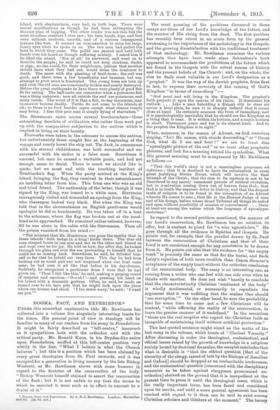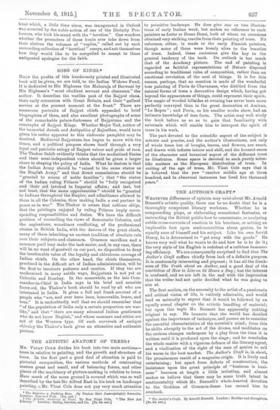DOGMA, FACT, AND EXPERIENCE.*
UNDER this somewhat unattractive title Mr. Rawlinson has collected into a volume five singularly interesting tracts for the times. His general point of view in theology will be familiar to many of our readers from his essay in Foundations. It might be fairly described as "left-centre," inasmuch as it sympathizes both with the orthodox and with the critical party. Mr. Ronald Knox, in his Dryden-like satire upon Foundations, scoffed at this left-centre position very wittily in the line, " What I believe is what the Church believes "; but this is a position which has been claimed by every great theologian from St. Paul onwards, and it was occupied for a generation in living memory by the late Bishop Westcott, as Mr. Rawlinson shows with some humour in regard to the doctrine of the resurrection of the body. " Bishop IrVestcott himself claimed to assert the resurrection of the flesh ; but it is not unfair to say that the terms in which he asserted it were such as in effect to amount to a denial of it."
• Dogma, Fact, an ol Experience. By A. E, J. Rawlinson, London Macmillan and CO. 1.211, (3d. Ilet.1 The most pressing of the problems discussed in these essays are those of our Lord's knowledge of the future, and the manner of His rising from the dead. The first problem has recently been raised in an acute form by the general awakening to the importance of the eschatology in the Gospels, and the growing dissatisfaction with the traditional treatment of that eschatology. Mr. Rawlinson examines the various attempts that have been made since Schweitzer's book appeared to accommodate the predictions of the future which are found in the Gospels with the actual course of history and the present beliefs of the Church ; and, on the whole, the clue he finds most valuable is our Lord's designation as a "prophet." It was the way of the Jewish prophets, from first to last, to express their certainty of the coming of God's Kingdom " in terms of immediacy" :— "God must and will bring in the Kingdom. The prophet's faith projects it upon the canvas of his vision. It dominates his outlook. . . . Like a man beholding a distant city in clear air across a level plain, he sees it so sharply defined that it seems close at hand. Its certainty assumes the form of immediacy, and it is psychologically inevitable that he should see the Kingdom as a thing that is near. It is within his horizon, and a man's horizon is short. Threescore years and ten is its utmost limit. And to the prophet the Kingdom is in eight."
When, moreover, in the season of Advent, we find ourselves singing, "Lo 1 He comes, with clouds descending," or " Great God, what do I see and hear I " we are to treat this
"apocalyptic picture of the end" as we treat other prophetic pictures, and look for a meaning behind the symbolism. What this general meaning must be is expressed by Mr. Rawlinson as follows
"That this world's story is not a meaningless progressus ad infinitive; that it is destined to have its culmination in some great justifying Divine Event, which will involve the final triumph of the Christ ; that the clue to its mystery is not to be discovered in any merelr immanent process of natural evolution, but in a salvation coming down out of heaven from God ; that God is in truth the supreme Actor in history, and that the deepest truth of religion is to be found in the conception of an Advent wherein He comes to man ; that He is the Eternal Judge of man and of his doings, before whose dread Tribunal all things lie naked and open without possibility of evasion or concealment . . . those at least are among the values which the language of apocalypse enshrines."
In regard to the second problem mentioned, the manner of our Lord's resurrection, Mr. Rawlineon has no solution to
offer, but is content to plead for " a wise agnosticism." He goes through all the evidence in Epistles and Gospels. He points out, for example, that the parallel drawn by St. Paul between the resurrection of Christians and that of their Lord is not consistent enough for any conclusion to be drawn from it. He points out also that the evidence for "the empty
tomb" is precisely the same as that for the burial, and finds Loisy's rejection of both more credible than Canon Streeter's acceptance of the empty tomb without the orthodox conclusion of the resuscitated body. The essay is an interesting one, as coming from a writer who can feel with one side even when he thinks with another. He does not wish "hastily to conclude that the characteristically Christian sentiment of the body' is wholly sentimental, or necessarily to repudiate the argument that it was unfitting that the sinless One should see corruption.'" On the other hand, he sees the probability that for some time to come not a few Christians will be content, " while affirming the reality of the resurrection, to leave the precise manner of it undefined." In the meantime " those are the real sceptics who regard the Christian faith as incapable of maintaining itself without artificial protection."
This last-quoted sentence might stand as the motto of the last essay in the volume, which treats of " Clerical Veracity." After discussing in order the theological, ecclesiastical, and ethical issues raised by the growth of knowledge in a religious society bound by doctrinal formulae, the essayist concludes that what is desirable, is " that the ethical question [that of the sincerity of the clergy, raised of late by the Bishops of Zanzibar and Oxford] should be dropped as an uncharitable irrelevance, and the ecclesiastical question [concerned with the disciplinary
measures to be taken against clergymen pronounced un- orthodox] shelved on the ground that it is inexpedient at the present time to press it until the theological issue, which is the really important issue, has been faced and considered upon its merits, and until a more general agreement has been reached with regard to it than can be said to exist among Christian scholars and thinkers at the moment." The heresy
hunt which, a little time since, was inaugurated in Oxford was arrested by the noble action of one of the Divinity Pro- fessors, who took his stand with the " heretics." One wonders whether the promoters of these bunts ever take down from their shelves the volumes of " replies," called out by each succeeding collection of " heretical " essays, and ask themselves how they would like to be compelled to assent to these antiquated apologies for the faith.

















































 Previous page
Previous page